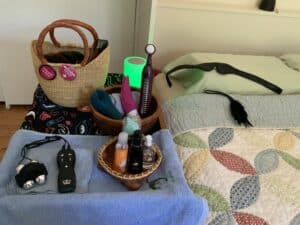Posts Tagged ‘senior relationships’
LATitude by Vicki Larson
LATitude: How You Can Make a Live Apart Relationship Work
by Vicki Larson
Reviewed by Mac Marshall

Vicki Larson, photo credit Kim Thompson Steel
LAT stands for Live Apart Together. In her welcome book about this new lifestyle, Vicki Larson notes that at least three things must occur for a relationship to be considered LAT:
- Two people agree that they are a committed romantic couple;
- Others view them as a committed romantic couple;
- They intentionally reside in separate homes.
LAT has grown in popularity in recent years, especially among divorced or widowed older adults. Many seniors find that living separately from their romantic partner provides an attractive combination: committed companionship along with personal independence.
 “There are several studies indicating that living apart from your romantic partner benefits your sex life,” says Larson. “LAT couples often experience more passion, idealize their partners more, daydream about their relationship, and report more loving feelings toward their partner than couples who live together.” Larson’s own interviews revealed that compared to couples who live together, LAT couples:
“There are several studies indicating that living apart from your romantic partner benefits your sex life,” says Larson. “LAT couples often experience more passion, idealize their partners more, daydream about their relationship, and report more loving feelings toward their partner than couples who live together.” Larson’s own interviews revealed that compared to couples who live together, LAT couples:
- Have the same or even higher levels of commitment;
- Feel equal or greater trust for their partners;
- Have the same or higher levels of stability;
- Experience equal or more relationship satisfaction.
LAT relationships typically offer a couple equality, intimacy, stability, and more satisfying sex than if they resided under one roof. “Absence not only seems to make the heart grow fonder, it also makes the libido stronger.”
Larson lists the reasons most people state for getting married: love, “lifelong commitment, companionship, children, having the relationship be recognized by a religious ceremony, financial stability, and…legal rights and benefits.” She notes that living together is not mentioned as a reason to wed. Indeed, “all the stated reasons for marrying can be achieved while living apart from your romantic partner.” In LATitude, she presents examples of married couples who actively choose to live apart happily, often for decades.
To succeed in a LAT relationship, you must feel secure in your sexual relationship. “Ultimately, it comes down to this: Are you with someone you trust, and is that person worthy of your trust? And are you someone your partner can trust?” With or without marriage, LAT rests on mutual trust to abide by whatever agreements and boundaries a couple establish, including whether to be monogamous or consensually non-monogamous. Larson quotes a therapist who is in a longtime LAT partnership: “Before you take this step, you have to be really secure in your relationship. The commitment you need in your relationship can’t be half-assed. It takes more trust when you’re not going to see the person and you have no idea what they’re doing all day or night.”
If you are a senior intrigued by or contemplating an LAT relationship, Larson’s book is essential reading. She also addresses financial matters, legal issues, and decisions about caregiving as aging partners require more assistance. These are especially relevant to our age group. You’ll come away from her book with a solid understanding of the pros and cons of LAT as you chart your own course.
Larson’s book is essential reading. She also addresses financial matters, legal issues, and decisions about caregiving as aging partners require more assistance. These are especially relevant to our age group. You’ll come away from her book with a solid understanding of the pros and cons of LAT as you chart your own course.
My own experience: I am 80 years old. I had two long marriages. The first one ended in divorce and the second with my wife’s death. I have no desire to remarry. As a widower I am now in a delightful and fulfilling LAT relationship. I find it satisfying in a host of ways. My partner and I each live in our own home and see one another several times a week, including one or two “overnights.” We communicate daily. We maintain our separate friendship networks, along with friends in common. Sometimes we travel together, sometimes solo. We keep our finances separate and often treat each other to dates or trips. We schedule regular sex dates in advance. The anticipation of such planned intimacy adds to the excitement. Disadvantages to LAT? I can’t think of any!
Do you have a LAT arrangement? I invite you to comment.

Mac Marshall, PhD is a retired anthropology professor, researcher, and author who is delighted to explore sexuality studies at this time of his life.

Purchase LATitude: How You Can Make a Live Apart Relationship Work from Bookshop.org. Visit Vicki Larson’s website.
“What We’ve Learned About Sex Lately”: Senior Wisdom
I invited my newsletter subscribers to tell me what they’ve learned about sex lately that has enhanced their sex life. The responses illustrate how far we’ve come in acknowledging that seniors are full human beings with sexual needs and desires, and how we are empowering ourselves to fulfill them.
Enjoy Sex Without Penetration
When penis-in-vagina (PIV) intercourse is no longer dependable or possible, it’s an opportunity to explore sex without penetration, which you may find gloriously satisfying. Here’s what readers said:
- “I’ve learned that sex without penetration provides me and my partner with at least as much core-shaking pleasure as does PIV. Both are very nice, but my notion of ‘real sex’ has broadened to center now on sex without penetration.”
- “My wife and I enjoyed a comfortable, mostly vanilla sex life for 45 years, and then it ceased after I lost the ability to provide a lasting erection. We accepted that as an inevitable, age-related thing and believed that sex without penile penetration was not complete. Research, including your blog and your books, opened my mind to the idea that sexual gratification for older folks was healthy, desirable, and neither inappropriate nor impossible without an erection.”
- “You may have issues maintaining an erection hard enough for sustained penetration. PIV sex is not the only way to have sex. You can have extraordinary pleasure and orgasms even with a soft penis.”
- “At 65, I’ve learned a more expansive idea of sex, one that isn’t so genitally focused. Every part of my body can be an erogenous zone. My partner and I enjoy hours of pleasuring each other, engaging in ‘outercourse’: manual, oral, and anal stimulation. We may have a single orgasm and continue pleasuring. We might enjoy several orgasms, or one extended orgasm. We have more of a sense of play and exploration.”
(For more about non-PIV sex, view “Great Sex Without Penetration,” my most popular webinar.)

Overcome Challenges
Yes, aging brings obstacles to good sex. That’s no reason to give up. Instead, explore solutions, as these readers did:
- “I honestly didn’t know our sex drives would slow down. Nobody tells you that a strong libido has a shelf life. Realizing that the days of spontaneous combustion were over for both of us, I felt like I’d been ripped off by life. With time, laughter, tears, and a lot of talking and thinking — plus a vibrator, erotica, and soft porn — my husband and I created a place where sex is a wonderful mini-vacation where we give and receive pleasure. It’s no longer my obsession, but it’s also not an afterthought.”
- “What to do when you realize that the only sex you know and have enjoyed for 45 years won’t work anymore? My wife has lichen sclerosus of the vulva. We can’t have penetrative sex anymore because she is so sensitive. We had to completely relearn how to have sex, first conquering our belief that sex other than penetrative missionary sex was shameful or sinful. We have learned that we can continue to be intimate and enjoy sex together.”
- “Because I couldn’t orgasm with intercourse and sometimes I had to finish myself off alone, after 20 minutes of my husband doing everything in his power to make me come, I thought our sex life was deficient and substandard. Joan’s writing truly helped me. To read an expert telling me that masturbation was real sex; oral sex was real sex; sex with sex toys to enable us to orgasm was real sex? I realized I was having quite a bit of real sex, and I didn’t recognize it. Two people who love the hell out of each other and fit together like puzzle pieces thinking that they’re defective because their sex life didn’t fit the standard definition? Your words freed me from feeling inadequate, broken, and damaged.”
Bring Back the Spice
If you’re in a long-term relationship that has lost its excitement, these readers share what works for them:
- “We find planned, weekly date-night encounters far more enjoyable than spontaneous episodes, because planning a scene enhances anticipation. It’s a form of extended foreplay. We are consistently ready for sex well before the next date-night, but we deny ourselves, heightening the desire to extreme levels for days.”
- “I’m 80, and my mind is my biggest turn on. I am no longer afraid to share my fantasies with my partner. It is a delight not to be ashamed of these wonderful and imaginative ideas where I get to determine what I experience in my mind while making love with my partner.”
- “After 33 years of marriage, I realize that both partners need to choose to keep their relationship spicy and active. Both must be honest and frank about their desires. Don’t be freaked out if you two disagree on what you’d like to do. Just treat it like every other issue you’ve disagreed on through the years: listen, suggest, compromise, and give it time.”
Explore New Kinds of Relationships
We were brought up to value only a lifelong, monogamous relationship. Sometimes that works for us; often it doesn’t. It’s never too late to explore a new relationship — or a new kind of relationship:
- “After much reading and heart-to-heart conversations with my more experienced lover, I’ve embraced consensual nonmonogamy at age 74 as an honest and happy-making way of being in a primary relationship. It allows each of us to celebrate both our independence and our connection based upon a solid foundation of frank, open communication. I have the freedom (should I so choose) to pursue other relationships without jeopardizing my highly valued primary tie. And, she likewise, has that freedom. Never taking my partner for granted adds a special sexy frisson to our connection.”
- “I’m 72. After my dear heart passed away and I hadn’t had sex for 5 years, I reconnected with my boyfriend from 43 years ago. Our relationship the first time around had been sex, drugs, and rock and roll. Now we’re in sync with getting up in the middle of the night to pee! We’re in a long-distance relationship for now, with sex being a big part of our daily conversations.”
- “After 26 years of an unfulfilling sex life that lasted minutes at best, I was alone and lonely. At 71, I met someone new. We can barely keep our hands off each other, like in the scene from West Side Story where everyone disappears into the scenery. We’re both widowed and realize that tomorrow is promised to no one. Whether or not it lasts, I plan to suck every bit of life and juice from this new relationship. I am burning daylight here.”
Sex Keeps Getting Better
Many readers wanted to share why sex at our age is better than ever:
- “We have a whole new attitude towards sex, accepting that whatever provides immediate pleasure also benefits our long-term health and relationship. We are more respectful of each other and display a high level of intimacy outside the bedroom as well as in. We are more comfortable with openly discussing sex than we ever were.”
- “Sex is better now than in our younger days because the pace and respectful desire to please each other is more refined than the more urgent hormone-driven copulations in the past.”
- “As I age, I am more sexually comfortable, adventurous and voracious. As a young woman, I was painfully shy, inhibited, and sure I wasn’t attractive. Now I feel strong, capable, sexy, attractive and free to express myself sexually and sensually.”
- “I love an older woman’s body. It’s about how she feels about herself, how much she gives herself up to pleasure and takes joy in her body. In the past decade, I’ve had partners dealing with wrinkles, stretch marks, cellulite, diabetes, heart conditions, Bell’s Palsy, IBS, and none of it has been an impediment to loving pleasure and desire.”
- “I’m much more excited about exploring than I ever was in my younger days. Touch is an integral part of the experience for me and I teach my partner how and where to touch me, and I do the same for him. I have fewer inhibitions and I’m focused on enjoying all the sensations.”
- “Sex in my 70s is relaxed, playful, fun, unhurried, experimental, and made wonderful by open, easy, frank communication with my partner about what we each do and don’t like. We feel closeness and trust, and our orgasms are happily extended as we pleasure one another without stress or anxiety or rush. Now is the best age in my entire life for uncomplicated, completely happy, and totally delightful sex!”
- “My lover (64) and I (88) just celebrated our 5th anniversary with a weekend frankly devoted to ‘sex at our age’ and loving it. It was a soul-blending celebration. Most important to us are (1) learning to listen before responding; (2) responding freely, not out of earlier patterns, but aware of the new definitions and opportunities for growth; (3) being willing to risk, try the new, re-invent. Of course, I’m vulnerable and have shed tears often. But, ah, the growth —beyond imagination.”

Some take-away tips from these reader experiences
- A sexual problem is a challenge, not a defeat. It’s an opportunity to learn and to explore.
- Expand your notion of what kind of sex is satisfying to you.
- Get creative. Try new things.
- Communicate with your partner about what you’d like to try.
- Treasure the pleasure!
This article was first published as “Sex at our Age: How far we’ve come” at SeniorPlanet.org, May 21, 2018.
LAT (Living Apart Together) for Seniors By Mac Marshall
Many of us over 60 are widowed, divorced, or maybe single our whole lives. We’ve gotten used to being independent. We’ve created a life for ourselves, with our own routines, habits, activities, and friends. We’re happy living on our own.
Then we meet someone — and ka boom!
Hearts aflutter, sex drive in high gear, intimacy is ours. We fall in love. Our closeness grows. We feel a strong commitment to each other. Our next step must be…
No, no, no! We don’t want to get married. We don’t even want to live together.
We relish our visits — especially the overnight ones! — and we equally relish the return to our own home afterwards. For many of us, the idea of marriage or even cohabitation may be unattractive, undesirable, or unworkable. Because of our personalities or our circumstances, we don’t want to mingle homes, finances, and legal obligations. Fortunately, there’s a lifestyle choice and relationship modality that describes what we want, and many of us are living that way now.
LAT is shorthand for “living apart together.” LAT is a long-term, committed, romantic connection without an intent to share a home.
LAT presents an attractive long-term relationship alternative to traditional marriage. It is a lifestyle choice—a new emergent family form, especially among older adults.
In a LAT relationship, a couple who’ve developed strong, loving feelings for one another nevertheless choose to reside separately. Usually, they get together on a regular basis, but each retains a separate abode. People in a LAT relationship treasure their times together, and they equally value their autonomy and alone time. LAT offers the separation that complements our need for togetherness. For many, it provides the best of both worlds.
Why might you, as seniors, prefer a LAT relationship over marriage or living together?
- You each maintain your own home and private space.
- You each retain and interact with your own friends and social network.
- You each keep control over your own finances.
- You each pursue activities and hobbies which may not interest the other partner.
- You rely on each other for emotional intimacy and support without being together all the time.
- You celebrate your personal autonomy concurrent with the joy of regular close companionship.
- By not cohabiting 24/7, the time you spend together is ever sweeter.

Does LAT appeal to you? Do you live that way now? Any tips for readers who are considering LAT? We welcome your comments, experiences, and questions.


